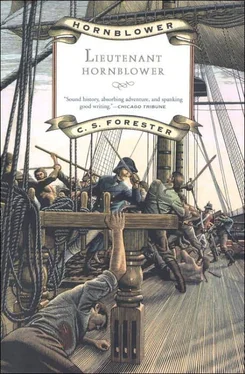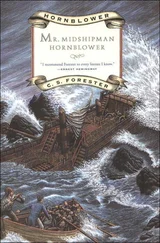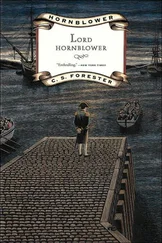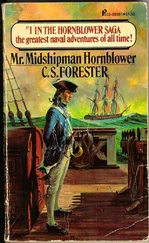Hornblower had the colonel as partner, and no one could be in the room without being aware that this final rubber was being played in an atmosphere of even fiercer competition than its predecessors. Not a word was spoken between the hands; the score was marked, the tricks swept up, the other pack proffered and cut in deadly silence. Each hand was desperately close, too. In nearly every case it was only a single trick that divided the victors and the vanquished, so that the rubber dragged on and on with painful slowness. Then a hand finished amid a climax of tension. The flag lieutenant and the Marquis had kept count of the score, and when Lambert took the last trick they uttered audible sighs, and the colonel was so moved that he broke the silence at last.
“Neck and neck, by God!” he said. “This next hand must settle it.”
But he was properly rebuked by the stony silence with which his remark was received. Parry merely took the cards from the colonel’s right side and passed them over to Hornblower to cut. Then Parry dealt, and turned up the king of diamonds as trump, and the colonel led. Trick succeeded trick. For a space, after losing a single trick, Lambert and Parry carried all before them. Six tricks lay before Parry, and only one before Hornblower. The colonel’s remark about being neck and neck was fresh in Bush’s ears. One more trick out of the next six would give the rubber to the two admirals. Five to one was long odds, and Bush uncomfortably resigned himself to his friend losing this final rubber. Then the colonel took a trick and the game was still alive. Hornblower took the next trick, so that there was still hope. Hornblower led the ace of diamonds, and before it could be played to he laid down his other three cards to claim the rest of the tricks; the queen and knave of diamonds lay conspicuously on the table.
“Rubber!” exclaimed the colonel, “we’ve won it, partner! I thought all was lost.”
Parry was ruefully contemplating his fallen king.
“I agree that you had to lead your ace, Mr. Hornblower,” he said, “but I would be enchanted to know why you were so certain that my king was unguarded. There were two other diamonds unaccounted for. Would it be asking too much of you to reveal the secret?”
Hornblower raised his eyebrows in some slight surprise at a question whose answer was so obvious.
“You were marked with the king, my lord,” he said, “but it was the rest of your hand which was significant, for you were also marked with holding three clubs. With only four cards in your hand the king could not be guarded.”
“A perfect explanation,” said Parry; “it only goes to confirm me in my conviction that you are an excellent whist player, Mr. Hornblower.”
“Thank you, my lord.”
Parry’s quizzical smile had a great deal of friendship in it. If Hornblower’s previous behaviour had not already won Parry’s regard, this last coup certainly had.
“I’ll bear your name in mind, Mr. Hornblower,” he said. “Sir Richard has already told me the reason why it was familiar to me. It was regrettable that the policy of immediate economy imposed on the Admiralty by the Cabinet should have resulted in your commission as commander not being confirmed.”
“I thought I was the only one who regretted it, my lord.”
Bush winced again when he heard the words; this was the time for Hornblower to ingratiate himself with those in authority, not to offend them with unconcealed bitterness. This meeting with Parry was a stroke of good fortune that any, halfpay naval officer would give two fingers for. Bush was reassured, however, by a glance at the speakers. Hornblower was smiling with infectious lightheartedness, and Parry was smiling back at him. Either the implied bitterness had escaped Parry’s notice or it had only existed in Bush’s mind.
“I was actually forgetting that I owe you a further thirty-five shillings,” said Parry, with a start of recollection. “Forgive me. There, I think that settles my monied indebtedness; I am still in your debt for a valuable experience.”
It was a thick wad of money that Hornblower put back in his pocket.
“I trust you will keep a sharp lookout for footpads on your way back, Mr. Hornblower,” said Parry with a glance.
“Mr. Bush will be walking home with me, my lord. It could be a valiant footpad that would face him.”
“No need to worry about footpads tonight,” interposed the colonel. “Not tonight.”
The colonel wore a significant grin; the others displayed a momentary disapproval of what apparently was an indiscretion, but the disapproval faded out again when the colonel waved a hand at the clock.
“Our orders go into force at four, my lord,” said Lambert.
“And now it is half past. Excellent.”
The flag lieutenant came in at that moment; he had slipped out when the last card was played.
“The carriage is at the door, my lord,” he said.
“Thank you. I wish you gentlemen a good evening, then.”
They all walked to the door together; there was the carriage in the street, and the two admirals, the colonel and the flag lieutenant mounted into it. Hornblower and Bush watched it drive away.
“Now what the devil are those orders that come into force at four?” asked Bush. The earliest dawn was showing over the rooftops.
“God knows,” said Hornblower.
They headed for the corner of Highbury Street.
“How much did you win?”
“It was over forty pounds—it must be about fortyfive pounds,” said Hornblower.
“A good night’s work.”
“Yes. The chances usually right themselves in time.” There was something flat and listless in Hornblower’s tone as he spoke. He took several more strides before he burst out into speech again with a vigour that was in odd contrast. “I wish to God it had happened last week. Yesterday, even.”
“But why?”
“That girl. That poor girl.”
“God bless my soul!” said Bush. He had forgotten all about the fact that Maria had slipped half a crown into Hornblower’s pocket and he was surprised that Hornblower had not forgotten as well. “Why trouble your head about her?”
“I don’t know,” said Hornblower, and then he took two more strides. “But I do.”
Bush had no time to meditate over this curious avowal for he heard a sound that made him grasp Hornblower’s elbow with sudden excitement.
“Listen!”
Ahead of them, along the silent street, a heavy military tread could be heard. It was approaching. The faint light shone on white crossbelts and brass buttons. It was a military patrol, muskets at the slope, a sergeant marching beside it, his chevrons and his half pike revealing his rank.
“Now, what the deuce?” said Bush.
“Halt!” said the sergeant to his men; and then to the other two, “May I ask you two gentlemen who you are?”
“We are naval officers,” said Bush.
The lantern the sergeant carried was not really necessary to reveal them. The sergeant came to attention.
“Thank you, sir,” he said.
“What are you doing with this patrol, sergeant?” asked Bush.
“I have my orders, sir,” replied the sergeant. “Begging your pardon, sir. By the left, quick—march!”
The patrol strode forward, and the sergeant clapped his hand to his half pike in salute as he passed on.
“What in the name of all that’s holy?” wondered Bush. “Boney can’t have made a surprise landing. Every bell would be ringing if that were so. You’d think the press gang was out, a real hot press. But it can’t be.”
“Look there!” said Hornblower.
Another party of men was marching along the street, but not in red coats, not with the military stiffness of the soldiers. Checked shirts and blue trousers; a midshipman marching at the head, white patches on his collar and his dirk at his side.
Читать дальше









